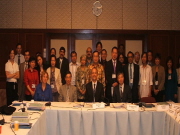Inaugural dialogue between Global Unions and ADB

UNI Global Union-Asia Pacific Regional Organization (UNI Apro) joined five other regional global union federations (GUFs) and the International Trade Union Confederation, Asia Pacific (ITUC AP) in a first-ever dialogue between global unions and the Asian Development Bank (ADB) last 17 May 2009 at the ADB Headquarters in Manila, Philippines.
Several high-level officials of the Asian Development Bank attended the dialogue session including Ursula Schaefer-Preus, Vice President for Knowledge Management and Sustainable Development and Bart Edes, Director for Poverty Reduction, Gender and Social Development Division. Six global union federations (GUFs) sent representatives from their Asia-Pacific regional organizations to the dialogue session: Public Services International (PSI-AP), Building and Woodworkers International (BWI-AP), International Transport Federation (ITF-AP), International Chemical Energy and Mines Workers Federation (ICEM), Education International (EI-AP), and UNI Global Union (UNI Apro). The four-person UNI Apro delegation was led by its Regional Secretary, Christopher Ng.

The seven-hour inaugural dialogue between the ADB and the global unions discussed a host of issues related to the financial, economic crisis and its impact on labor, flexible labor market policy and decent work, and best practice for ADB projects. In her keynote address, Ursula Schäfer-Preuss, Vice President for Knowledge Management and Sustainable Development of the ADB, noted that the meeting is taking place “as the world battles one of the worst global economic and financial crises since the depression” and that the meeting “provides an opportunity to exchange ideas on how to respond to the crisis and to stimulate job creation.” She also observed that “…we will not always be in agreement with every major stakeholder group, including organized labor. Nevertheless, we will endeavor to seek convergence in views and consensus on approaches”.
In response, ITUC AP General Secretary Noriyuki Suzuki expressed hope that the ADB and the global unions share a common development agenda and batted for economic growth with redistributive justice. UNI Apro Regional Secretary Christopher Ng commended the ADB for initiating the dialogue with the global unions and pledged that the global unions, the UNI Apro included, will contribute constructively to the present and future dialogues. PSI-AP Regional Secretary, Katsuhiko Sato said that the dialogue was a step in the right direction and is a good follow-up to the engagement of the global unions with the ADB during the ADB Governors’ Meeting in Bali three weeks ago where the UNI, BWI and the PSI together sent 80 representatives.
Considerable time was spent in discussing how core labour standards can be promoted in ADB projects. The ADB and the ILO has published a handbook on Core Labour Standards to encourage and assist policymakers at the national and regional levels as well as ADB staff, consultants, project teams and members of national implementing agencies involved in the design and implementation of country programs and projects to take into account CLS wherever and whenever appropriate. The global union representatives present however noted that there is a need to strengthen the language on CLS and that implementing mechanisms need to be institutionalized in order to ensure respect for core labor standards in ADB projects.
The dialogue was capped with a discussion on future cooperation where the global unions reiterated their advocacy for the creation of a Labor Desk at the ADB. Both the representatives from the ADB and the global unions expressed belief that future dialogues will be necessary and that the engagement of the global unions with the ADB should be institutionalized. ADB’s Bart Edes promised to connect ADB staff with the regional structures and country affiliates of the global unions. He further urged the global unions to actively participate in the ADB Social Development Learning Week and in the ADB’s on-going study on “Crisis Impact on Gender and Labor Markets in Affected Industries” as well as in the drafting of the ADB Whistle Blowers’ Policy and the review of the ADB’s Public Communications Policy.
In summary, the following are future possible joint cooperation and work between the ADB and the trade unions that came out of the seminar:
- Participation of trade unions in the next training for ADB staff during “Social Development” week. The trade unions can either participate or be resource persons in the training. This is to be held next January.
- Request for feedback on new provisions on ADB policies on Whistle Blower Protection and Public Communications Policy.
- Brown bag seminars that can be possible forums for GUFs to engage in more dialogue.
- Initiate cooperation between trade unions and with various ADB departments.
- Work with ITUC and GUFs to link national unions and ADB representatives/offices in those countries.
- Work with ITUC and GUFs to have role in the upcoming research/ survey of the impact of global economic crisis on women.

